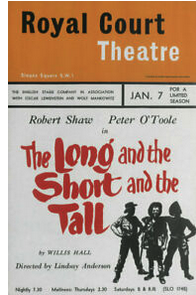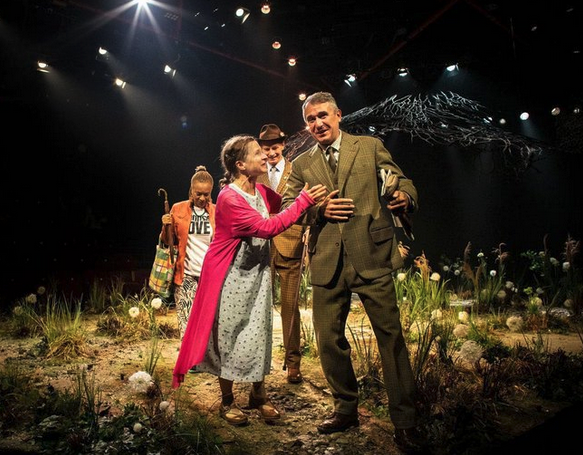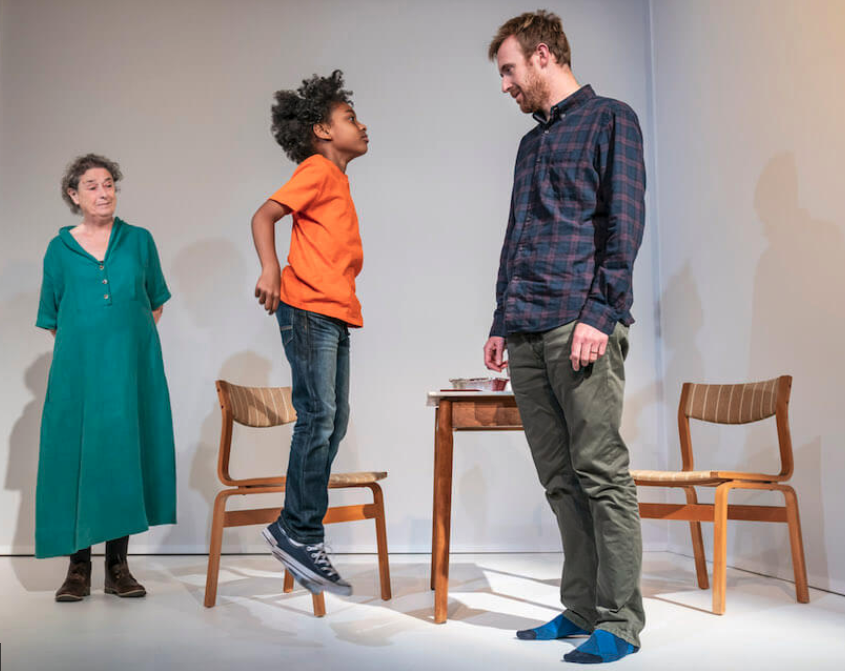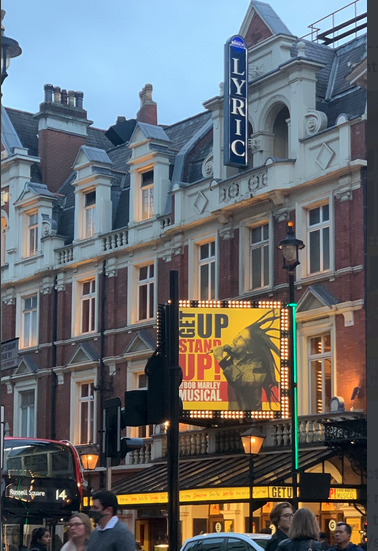For over 11 years, I used to file a weekly theatre review column for the Sunday Express, and although space was tight (typically 500 words), I used to love filling it with my passion for theatre, addressing an audience who weren’t necessarily aficionados, and hopefully occasionally igniting a similar enthusiasm to try something on, or especially off, the beaten track. Though my time there ended in unfortunate circumstances, completely unrelated to my professional responsibilities, one thing I enjoyed most about it was that I could distribute my word count entirely as I saw fit; there was no obligation to write at length about something that hadn’t interested me, but at the same time I was able to draw connections between shows that were otherwise unrelated.
So I’m going to attempt a similar thing here now, though I will also file stand-alone reviews, too, when a show warrants the coverage. I will also use this space to draw out wider thoughts on the industry triggered by the shows themselves and the contexts of their openings.
Even as we appear to be entering a 4th COVID wave, most of the West End has now bounced back — at least in physical terms — with the re-opening of every show after their enforced closures of the last 18 months culminating with last week’s return of Harry Potter and the Cursed Child and next week’s return of Dear Evan Hansen. Yet given how the West End — so badly scalded by the lockdown — has failed to enforce simple COVID mitigations, like compulsory mask wearing or limiting attendance strictly to those with proof of vaccinations or recent negative tests (routinely now applied on Broadway), I’m not at all confident that the West End won’t find itself shutting down all over again, so the pain of the last 18 months will have to be lived again; and this time, I worry that may of the shows won’t be coming back at all.
But meanwhile, I’m continually impressed by the optimism of producers in also launching new commercial shows in such an unpredictable landscape; and this week Shaftesbury Avenue saw the long-anticipated arrival of a new musical celebrating the life and career of Bob Marley, Get Up! Stand Up!, which naturally got the audience doing both of those things long before the end. It was originally announced to open in 2020, with Dominic Cooke directing and Kwame Kwei-Armah (who had staged his own Marley musical One Love at Birmingham Rep in 2017) among the producers.

In July 2020, Cooke stepped aside as director, to be replaced by Clint Dyer (now deputy artistic director at the National), and Kwei-Armah is no longer involved. In February, the opening was delayed to October, with the producers stating, “The producers are convinced that this joyous and uplifting show will be at its best when a full house can enjoy the legendary music of Bob Marley. For this reason they have decided to pause until a time when it is possible to open theatres at full capacity.”
They got their wish with a packed house on Wednesday night, with few people wearing masks (though Grace Jones, a few rows in front of me, sported goggles that made her look like an female aviatrix, to quote The Drowsy Chaperone, and the closest fashion comes to a full hazmat suit).
I get it that producers want people to let their hair down, but I’m not sure we should also be letting our guard down so negligently. So my enjoyment of this frequently joyous show was very much tempered by concern, too.

A previous jukebox show Thriller Live!, about another iconic musical superstar Michael Jackson, played a record 11 years at this address, launched long before his death but becoming a shrine for his fans after it; Marley was taken even sooner, at the age of just 36, and the show is itself a worthier celebration of his work and impact than the uncritical Jackson revue was, being altogether more nuanced, exhilarating and polished, too. (MJ, coming to Broadway in December, may offer a more rounded portrait of the problematic Jackson legacy).
It follows the standard tropes of the bio-musical, folding scenes from his life and work around some of his most famous songs; but though reading the programme may give you more information, both on his life and the impact of his work on the creators of this musical than the show eventually does, it rises above its own limitations by the sheer exhilarating force of hearing these songs performed live, with a low but insistent bass beat to the fore in Tony Gayle’s sound design and Sean Green’s musical direction. And Marley is fiercely played by Arinzé Kene, who embraces him (and us) so totally that it is not so much an impersonation as a living embodiment of his spirit.
This is a jukebox show I never thought I needed — but more than earns its place in the West End.

The Shark is Broken, an Edinburgh Fringe hit from 2019 finally transplanted to the West End, isn’t a show we needed to see, either, and its confined setting — the small boat from which the three men in Jaws do battle with a lethal shark in the infested waters of Cape Cod — doesn’t lend itself easily to filling a West End stage, albeit one dressed in a vast video cyclorama of the heaving ocean surrounding it, which in Nina Dunn’s video occasionally inserts a passing seagull or sailing boat (but no actual sharks).
Instead, we’re left with three actors impersonating three others, Ian Shaw (playing his own father Robert), Demetri Goritsas (as Roy Scheider) and Liam Murray Scott (as Richard Dreyfuss). Shaw has co-written it with Joseph Nixon, and makes plenty of imaginative leaps into what the three men might have been thinking and talking about during the tortuous filming of Jaws, as it got endlessly delayed by the malfunctioning mechanical shark. The alcoholic Shaw Senior — hiding bottles all over the boat — is vividly realised by his son, in what must be a painful reckoning with the demons that claimed his father when he was just nine years old. Dreyfuss, determined to become a ‘star’, is also shown to hanker after a life in the theatre, where Shaw was himself most at home.
But watching this ‘buddy’ play unfolding on a stage only has limited naval-gazing interest in the end. Re-watching Jaws, as I recently, did is more entertaining.

One of Robert Shaw’s most famous stage credits, mentioned here, was the original production of Willis Hall’s The Long and the Short and the Tall at the Royal Court in 1959 (pictured above), with Peter O’Toole; the Court remains one of the most influential new writing theatres in the country. In the last few weeks, I’ve seen revivals of Larry Kramer’s The Normal Heart and Connor McPherson’s Shining City, at the National and Stratford East respectively, that I saw the original London productions of at the Court (in 1986 and 2004); and currently at Chichester’s Minerva Theatre (running to November 6), is a revival of David Storey’s Home, originally premiered at the Royal Court in 1970.

’m alas too young to have seen that last one, which starred John Gielgud and Ralph Richardson as two residents of an unspecified institution passing the days; but seeing it now in Chichester, this haunting play about variously displaced souls — like a cross between Beckett and Pinter — emerges with a powerful resonance and overwhelming sadness in young director Josh Roche’s production. On a gorgeously landscaped garden set by Sophie Thomas (pictured above), it feels utterly tangible, too; and even if the casting seemed to me to err on the “younger” side, it made the play feel even more universal; these kind of breakdowns can occur at any age.

One of the Court’s most established relationships is with writer Caryl Churchill, whose work it has presented the world premieres of from her first professionally staged play Owners (1972) to her biggest hits Cloud Nine (1979), Top Girls (1982) and Serious Money (1987), is currently offering her latest play, What If If Only. It was originally announced that it would run for 14 minutes; in fact, it runs for roughly twenty, so that’s a significant bit extra. And such is the reverence for Churchill that the theatre was packed on the night I saw this typically enigmatic, cryptic piece about a man dealing with grief.

It packs more feeling into those twenty minutes than the entirety of the soulless would-be shocker of a revenge drama, Aleshea Harris’s Is God Is, which ends its run there tomorrow (October 23). There’s a numbing inevitability to this violent drama which has come to the Court after an off-Broadway run, though Ola Ince’s production is acted with an ugly intensity.

